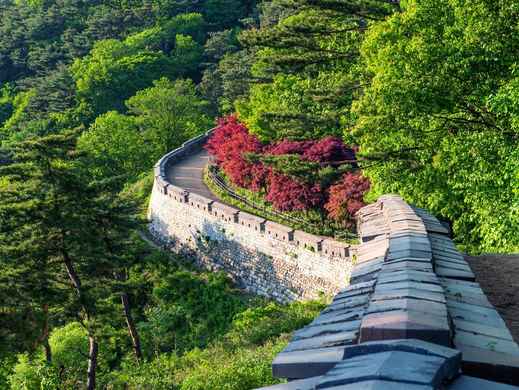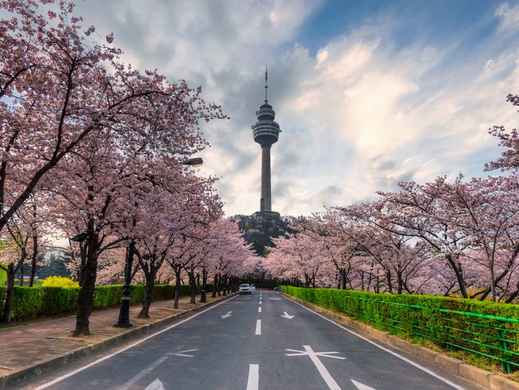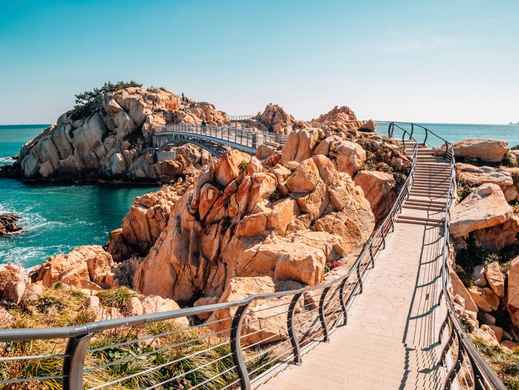


Suncheon
Asia
/
South Korea
/
Suncheon
Tucked away on Korea's southern coast, Suncheon is a refreshing blend of natural beauty and cultural heritage often overlooked by international travelers. This mid-sized city in South Jeolla Province enjoys a temperate climate with four distinct seasons—pleasantly warm springs, hot and humid summers, colorful autumns, and relatively mild winters. The city is cradled by mountains and opens up to Suncheon Bay, creating a diverse ecological landscape that earned it recognition as a UNESCO Biosphere Reserve.
Life in Suncheon moves at a gentler pace than Seoul or Busan, with locals embodying the warm hospitality South Jeolla Province is famous for. This region is known throughout Korea for its agricultural bounty and culinary traditions, reflecting a culture deeply connected to the land. While modern conveniences abound, Suncheon retains a traditional spirit, with many residents maintaining age-old customs and a deep reverence for nature.
What makes Suncheon truly special is its harmonious balance between preserved ecosystems and cultural landmarks. Unlike heavily industrialized Korean cities, Suncheon prioritized environmental conservation, making it a rare urban area where wetlands, mountains, and traditional villages coexist with city life. This green approach has preserved both natural wonders and cultural heritage that might otherwise have disappeared during Korea's rapid development era.
Food enthusiasts will discover authentic Korean cuisine with regional specialties like Suncheon bibimbap (featuring namul mountain vegetables), hanjeongsik (traditional course meals), and fresh seafood from the nearby coast. The local food scene emphasizes clean, fresh ingredients—many restaurants source produce directly from surrounding farms, creating farm-to-table experiences before the concept became trendy.
Don't miss Suncheon Bay Wetland Reserve, home to vast reed fields and over 140 bird species, offering spectacular sunset views over the tidal flats. The meticulously preserved Naganeupseong Folk Village provides a living museum of traditional Korean life where some residents still maintain centuries-old lifestyles. For nature lovers, Seonamsa Temple nestled in Jogyesan Mountain offers a serene cultural experience amid ancient trees and flowing streams—a perfect example of Korea's harmonious integration of spiritual practices with natural landscapes.

Travel Tips for Suncheon
What you need to know before traveling here
Getting Around Suncheon
A guide to Suncheon's local transportation
If you're an adventurous traveler who prioritizes flexibility, renting a car can be a great option. Renting a car can give you the freedom to explore the city of Suncheon and its surrounding areas without being tied to public transportation schedules. Several local car rental companies provide this service with a wide selection of vehicles. You can also rent a car easily on the Traveloka app!
Practical Tips for Suncheon
Things to prepare and best way to visit
Suncheon is generally very safe with low crime rates, making it suitable for solo travelers including women. Standard precautions apply, but violent crime is rare. The biggest challenges for solo travelers are language barriers and limited nightlife options compared to larger cities. Local residents are typically helpful to visitors despite communication difficulties.
South Korea has some of the world's fastest internet, and Suncheon is no exception. Free public Wi-Fi is available in most tourist areas, government buildings, and parks. For continuous connectivity, consider renting a portable Wi-Fi device at the airport or purchasing a local SIM card. Most accommodations offer reliable high-speed connections, though traditional hanok guesthouses might have limited coverage in certain rooms.
Allocate at least half a day (4-5 hours) to properly experience Suncheon Bay Wetland Reserve. This allows time for the walk along the reed-lined paths, visiting the observatory, and potentially taking a boat tour. Including the nearby Suncheon Bay Garden would require a full day. Visit late afternoon if possible, as the sunset over the wetlands creates spectacular photo opportunities.
The weather in Suncheon, South Korea, is consistently pleasant throughout the year. In summer, Suncheon experiences warm, humid, wet, and mostly cloudy weather. In contrast, in winter, the weather in Suncheon is cold, windy, and mostly sunny. Temperatures in Suncheon vary greatly throughout the year, ranging from 23°C to 87°C, and rarely drop below 14°C or exceed 93°C.
If you prefer a warm-weather vacation, the best time to visit Suncheon is from late May to late June and late August to late September. On the other hand, if you want a vacation with cooler weather, January is a good time to visit Suncheon. It is best to avoid July and August as these months tend to experience heavy rainfall.
Suncheon bibimbap features an array of mountain vegetables (namul) with a distinctive flavor profile different from versions elsewhere in Korea. Haejangguk (hangover soup) is another regional specialty, particularly the Suncheon-style preparation with dried pollack. Don't miss the region's famous barley rice, served with seasonal banchan (side dishes) that showcase South Jeolla Province's reputation as Korea's breadbasket.
See All Practical Tips for Suncheon

Explore Suncheon
Create your itinerary with our top picks below

Travel Tips for Suncheon

Explore Suncheon


































 Facebook
Facebook Instagram
Instagram TikTok
TikTok Youtube
Youtube Telegram
Telegram
